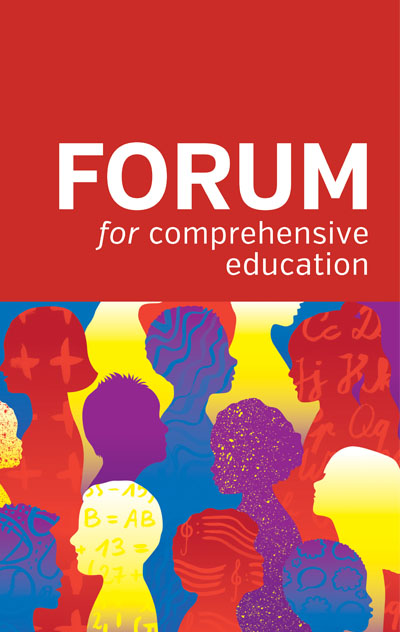
FORUM Volume 56 (2014) Issue 1
Print ISSN 1474-7685 - Online ISSN 2047-7171
<< Previous issue | All issues | Next Issue >>
Adventures in Education
Contents
Editorial. Adventures in Education, pages 3‑7
Patrick Yarker Free to download
'We're a little bit lost aren't we?': outdoor exploration, real and fantastical lands, and the educational possibilities of disorientation, pages 9‑18
DEB WILENSKI
Learning from Children: learning from Caroline Pratt (1867-1954). Early Progressives in Early Years Education, pages 19‑30
MARY JANE DRUMMOND
The Dinosaur in the Classroom: what we stand to lose through ability-grouping in the primary school, pages 45‑54
RACHEL MARKS
Beautiful Nonsense: children's authentic art-making and Deleuzian difference, pages 55‑64
VICKY GRUBE
In Progress Internationally: student voice work in four countries, pages 65‑66
JANE McGREGOR
Spaces for Partnerships. Teach the Teacher: student-led professional development for teachers, pages 67‑78
ROGER HOLDSWORTH
Ontario's Student Voice Initiative, pages 79‑90
JEAN COURTNEY
Enacting Student Voice through Governance Partnerships in the Classroom: rupture of the ordinary for radical practice, pages 91‑104
EMILY NELSON
Student-Staff Partnerships as Transformational: the 'Students as Learners and Teachers' program as a case study in changing higher education, pages 105‑114
ALISON COOK-SATHER
A Teacher's Retrospective View of the Syrian Educational System, pages 115‑122
RAMI ABU ZARAD
Comprehensive Education Bolivarian-style: the alternative school in Barrio Pueblo Nuevo, Venezuela, pages 123‑132
MIKE COLE
Writing Spaces, Professional Places: how a teachers' writing group can nurture teaching identities, pages 131‑138
JENIFER SMITH, REBECCA GRIFFITHS
A Matter of Ideology: a response to the Draft Primary Mathematics Programmes of Study, pages 133‑142
TONY COTTON
My NQT Year: a primary teacher's account of his first year of teaching, pages 139‑144
DAVID HEWGILL
What Is To Be Done? Possibilities for the Counter-offensive, pages 143‑146
TREVOR FISHER
Classrooms as Sites of Curriculum Delivery or Meaning-making: whose knowledge counts?, pages 147‑156
JOHN YANDELL
The Best That Has Been Thought and Said?, pages 157‑166
ROBIN ALEXANDER
